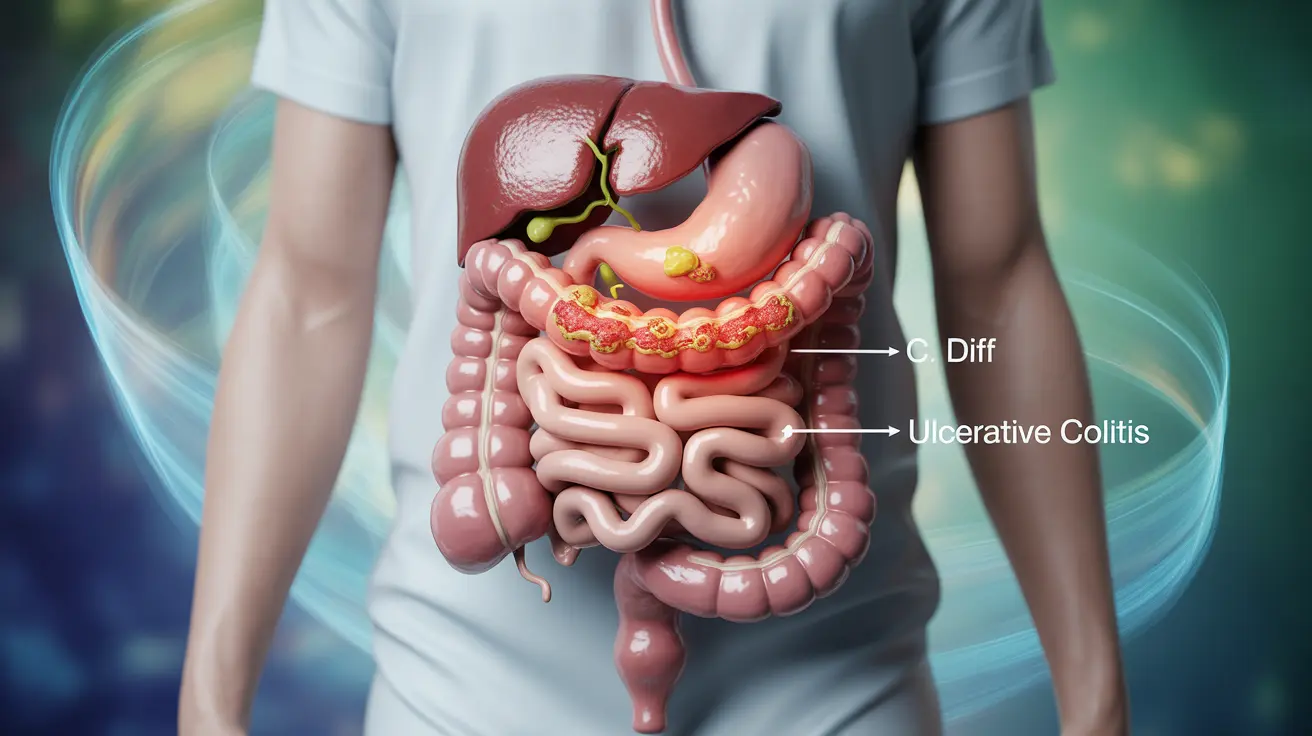For individuals living with ulcerative colitis (UC), managing digestive health is already challenging. When Clostridioides difficile (C. diff) infection enters the picture, it can create additional complications that require prompt attention and specific treatment approaches. Understanding the relationship between C. diff and ulcerative colitis is crucial for effective management and prevention.
This comprehensive guide explores how C. diff infections affect people with ulcerative colitis, including recognition of symptoms, diagnostic procedures, treatment options, and prevention strategies. By understanding these key aspects, patients can better advocate for their health and work effectively with their healthcare providers.
Recognizing C. Diff Symptoms in Ulcerative Colitis Patients
Identifying C. diff infection in ulcerative colitis patients can be challenging because many symptoms overlap with UC flares. However, certain signs may indicate the presence of C. diff:
- Severe diarrhea that may be watery
- Increased frequency of bowel movements
- Distinctive foul-smelling stools
- Fever and chills
- Severe abdominal pain or cramping
- Dehydration
- Loss of appetite
If you experience these symptoms, especially if they differ from your typical UC symptoms or occur after antibiotic use, contact your healthcare provider immediately.
Diagnostic Process for C. Diff in UC Patients
Healthcare providers use specific testing methods to diagnose C. diff infection in patients with ulcerative colitis:
- Stool sample testing
- PCR testing to detect C. diff toxin genes
- Enzyme immunoassay (EIA) testing
- Colonoscopy in certain cases
Early diagnosis is crucial as C. diff can significantly worsen UC symptoms and lead to serious complications if left untreated.
Treatment Approaches
Treatment for C. diff infection in UC patients requires a carefully coordinated approach:
Antibiotic Therapy
The primary treatment typically involves specific antibiotics such as vancomycin or fidaxomicin. These medications target the C. diff infection while minimizing impact on beneficial gut bacteria.
Managing UC Treatment
Healthcare providers may need to adjust ongoing UC medications during C. diff treatment. This might involve temporary modifications to immunosuppressive medications to allow for effective infection treatment.
Supportive Care
Additional supportive measures often include:
- Fluid and electrolyte replacement
- Probiotics (as recommended by healthcare providers)
- Dietary modifications
- Close monitoring of symptoms
Prevention Strategies
People with ulcerative colitis can take several steps to reduce their risk of C. diff infection:
- Practice thorough hand hygiene
- Use antibiotics only when necessary and as prescribed
- Maintain regular communication with healthcare providers
- Follow proper food safety guidelines
- Consider probiotic supplementation (with medical guidance)
- Avoid unnecessary hospital stays when possible
Frequently Asked Questions
What symptoms suggest a Clostridioides difficile (C. diff) infection in someone with ulcerative colitis?
Key symptoms include severe or worsening diarrhea, particularly if watery and foul-smelling, fever, abdominal pain, and increased frequency of bowel movements beyond usual UC symptoms. These symptoms often appear after antibiotic use or hospitalization.
How is C. diff infection diagnosed in patients with ulcerative colitis?
Diagnosis typically involves stool testing using PCR methods or enzyme immunoassay tests to detect C. diff toxins. Healthcare providers may also perform additional tests to differentiate between UC flare-ups and C. diff infection.
What are the recommended treatments for C. diff infection in people living with ulcerative colitis?
Treatment usually involves specific antibiotics like vancomycin or fidaxomicin, along with possible adjustments to UC medications. Supportive care includes hydration, electrolyte replacement, and careful monitoring of symptoms.
Can a C. diff infection cause flare-ups or worsen ulcerative colitis symptoms?
Yes, C. diff infection can trigger UC flares and significantly worsen existing symptoms. The infection can cause increased inflammation in the colon and may lead to more severe complications if not promptly treated.
How can patients with ulcerative colitis reduce their risk of developing a C. diff infection?
Prevention strategies include proper hand hygiene, judicious use of antibiotics, regular medical check-ups, and following food safety guidelines. Patients should also discuss probiotic use with their healthcare provider and minimize unnecessary hospital exposure.




